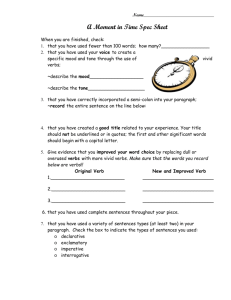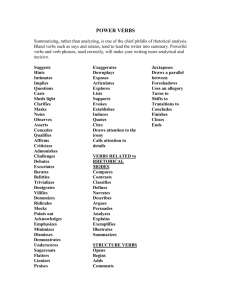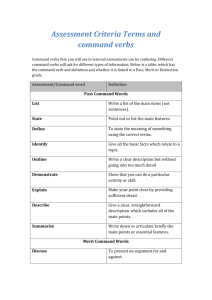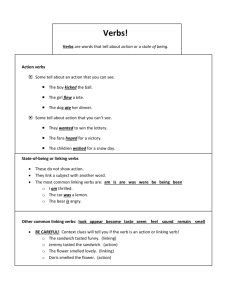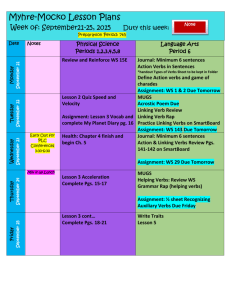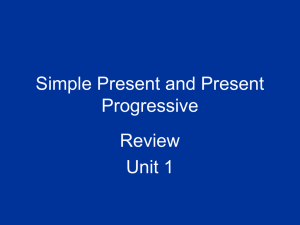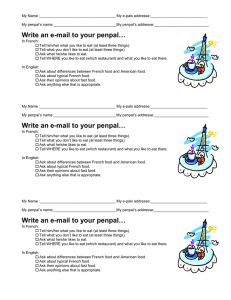Work for 11/17-11/24, Packet L
advertisement
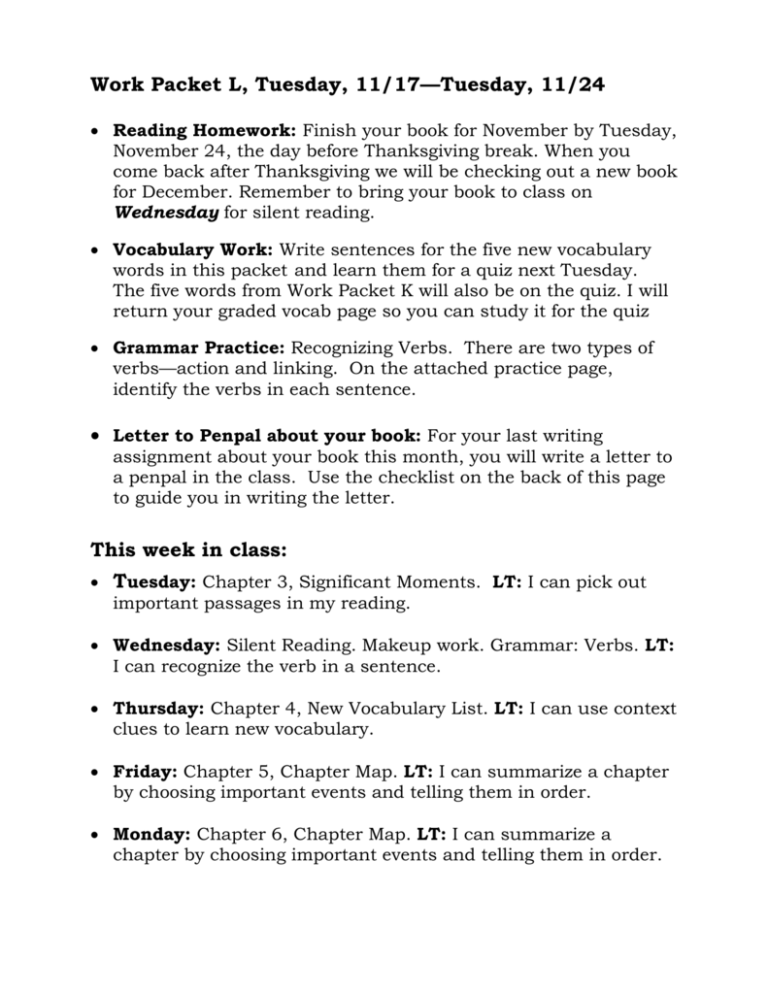
Work Packet L, Tuesday, 11/17—Tuesday, 11/24 Reading Homework: Finish your book for November by Tuesday, November 24, the day before Thanksgiving break. When you come back after Thanksgiving we will be checking out a new book for December. Remember to bring your book to class on Wednesday for silent reading. Vocabulary Work: Write sentences for the five new vocabulary words in this packet and learn them for a quiz next Tuesday. The five words from Work Packet K will also be on the quiz. I will return your graded vocab page so you can study it for the quiz Grammar Practice: Recognizing Verbs. There are two types of verbs—action and linking. On the attached practice page, identify the verbs in each sentence. Letter to Penpal about your book: For your last writing assignment about your book this month, you will write a letter to a penpal in the class. Use the checklist on the back of this page to guide you in writing the letter. This week in class: Tuesday: Chapter 3, Significant Moments. LT: I can pick out important passages in my reading. Wednesday: Silent Reading. Makeup work. Grammar: Verbs. LT: I can recognize the verb in a sentence. Thursday: Chapter 4, New Vocabulary List. LT: I can use context clues to learn new vocabulary. Friday: Chapter 5, Chapter Map. LT: I can summarize a chapter by choosing important events and telling them in order. Monday: Chapter 6, Chapter Map. LT: I can summarize a chapter by choosing important events and telling them in order. Tuesday: Quiz on vocabulary and story. Letter to penpal due. LT: I can write a letter to a classmate describing a book I read. Homework Writing Assignment: Letter to Penpal about your April book: Now that you have finished your April book, your homework for this week is to write a letter to your class penpal, _________________, about the book you read. Your letter is required to have the following things in it. Please put a checkmark next to each requirement below to confirm that you have followed it. Attach this checklist to your letter. _____ It should have a heading at the top (name, date, period) _____ It should include a salutation (Dear ______________) _____ It should include an appropriate closing with your name (Sincerely, ________________________) _____ It should be about one-page long. _____ It should include at least two indented paragraphs. _____ It should be in complete sentences that start with capital letters and end with a period or other endmark. In the course of the letter, you should do the following: ______ Give the title and the author of the book. ______ Talk about how you liked the book. ______ Talk about how things worked out for your main character(s). ______ Talk about what the main conflict in the book was and how it was resolved. ______ Talk about what point you think is the “climax” of the book—that point late in the book when things are most exciting, just before the conflict begins to be resolved. ______ Talk about any “themes” that you find in the book— messages about life or people from the author. A template to show you how the letter should look is available in a folder on the windowsill in the room. Due Date: Tuesday, November 24 Name____________________________________Date_________Period_________ Action Verbs: Some verbs express actions: Sam clung to the rope. The actions may be one that you cannot see: Kate needed help. Whether you can see the action or not, an action verb says that something is happening, has happened, or will happen. Underline the action verbs in the following sentences: 1. Polly hopped in the van and fastened the seat belt. 2. I locked the van when I got out. 3. Dad told Hank to rock the baby. 4. His dad sat at his desk. 5. The cat tips the big can, and the garbage falls out. 6. Sherry looked in the attic for the box. 7. The people of the village grow rice. 8. Clovis smelled the smoke first. Linking Verbs: A few verbs do not tell about an action. They may state that someone or something exists, or they may link the subject with a word or words that describe or rename the subject. I am. (says that someone exists) The sky looks gloomy. (links subject with description) These verbs are called linking verbs because they can be used to connect, or link, the subject with some other word or words that describe it. be (am, are, is was, were, been, being) became Linking Verbs look smell appear taste feel grow Underline the linking verbs in the following sentences: 1. The potato soup smells delicious. 2. Vito felt healthy all winter. 3. Angela became the new class president. 4. The music grows very loud at the end of the piece. 5. She seemed quite studious as a child. seem sound remain 6. She was also wild and tomboyish. 7. The arts were popular in Sweden during Christina’s reign. 8. The pizza smelled delicious. Name____________________________________Date__________Period________ VOCABULARY for Breadwinner, pp. 34-53, Chaps. 3-4 occupation (idea noun), p. 35: the holding and control of an area by a foreign army or government “One of her aunts had been arrested . . . for protesting the Soviet occupation of her country.” Your sentence: _______________________________________________________ ________________________________________________________________________ distinguish (v.), p. 37: to see the difference between two things “The night was so dark, she could not distinguish between the window and the wall.” Your sentence: _______________________________________________________ ________________________________________________________________________ hesitated (v.), p. 39: paused; held back from doing something “Mother hesitated at the bottom of the stairs. Parvana thought she might be having second thoughts. Your sentence: _______________________________________________________ ________________________________________________________________________ exhaustion (idea noun), p. 46: extreme tiredness “Parvana had been so preoccupied with her own pain and exhaustion, she hadn’t given any thought to what her mother had been going through.” Your sentence: _______________________________________________________ ________________________________________________________________________ collapsed (v), p. 46: fell down; fell apart; caved in “[Mother] collapsed onto the toshak where Father had taken his nap just yesterday.” Your sentence: _______________________________________________________ ________________________________________________________________________


